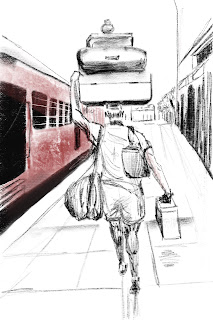Chandra-A biography of S Chandrashekhar.
CHANDRA
It was a great experience to read 'Chandra-A biography of S Chandrashekhar'. This book was for long
on my list of "to read". I did not have any great expectations from a
biography as compared to a work of fiction which is likely to be more engaging.
But then, what an
experience it was! I do not claim to have read many biographies, but I found this
to be a class in itself. Well, I am not going to review it but instead, narrate
how it was a revelation to me about many things such as :-
1. The social fabric of the society in the pre independence
era in Madras, especially in the traditional Brahmin families.
2.Although bound by such rigid customs, how Chandra's family
rose above them.....Even Lalita's (Chandra's wife) grandparents broke all social
taboo associated with a child widow in their family.Just remarkable.
3. Psychological influence of Mathematician Ramanujam on the
educated youth of that time.
4. How Chandra, in his maiden visit to UK, grappled with
extreme loneliness, alien surroundings/climate/food.
5.In what way Chandra
,who had already had already achieved a high stature in the scientific community at home, felt utterly dwarfed by the Giants in the world of science when he
entered the Cambridge university .
6. Chandra's emerging field i.e. astronomy and astrophysics
was treated as 'second class 'by the
physicists at that time as physics was considered the main stream.
7. Chandra's views about God and on being an Atheist.
8. Groupisms and parochialism in the scientific community in
India in those times ( sadly, may be true even now).
9. How science research and teaching was gradually built up
in the USA (It was considered infra dig to work in USA compared to UK and Europe
at that time).How the New World (as the USA was referred to then) gradually built
up its position of eminence in scientific fields.
10.How Chandra took up the responsibility of the editorship
of scientific journal and brought it to its zenith of respectability without
diluting his activities in his research work and teaching.
11.In 1930's Chandra made a major discovery ( he was only 19 years old then ) and was all set to announce it in the Royal Astronomical Society meeting. All along, his mentor who was a stellar figure in the field, appeared to be supporting his views. But at the meeting he not only rejected his hypothesis ,but even ridiculed him. Chandra was devastated. Other scientists, though convinced that Chandra was being treated unfairly, did not come to his rescue, due to the stature of his mentor His views were upheld almost 40 years later.
11.In 1930's Chandra made a major discovery ( he was only 19 years old then ) and was all set to announce it in the Royal Astronomical Society meeting. All along, his mentor who was a stellar figure in the field, appeared to be supporting his views. But at the meeting he not only rejected his hypothesis ,but even ridiculed him. Chandra was devastated. Other scientists, though convinced that Chandra was being treated unfairly, did not come to his rescue, due to the stature of his mentor His views were upheld almost 40 years later.
12. The problem of McCarthyism in 50's and how public felt a
sense of relief on the victory of the Democrats and JFK.
13. Compelling circumstances under which Chandra had to take
a painful decision to embrace US citizenship.
14. His views on whether India should invest in pure
science.
15.Chandra's impressions about his meetings with Nehru,
Indira Gandhi and Homi Bhabha.
16.His firsthand
experience about the state of science and scientists in the USSR.
17. Racial prejudice faced by him and how he coped with it.
18.It was heartening to note that without exception
,everyone with whom he had come in contact, be it the scientists, the students,
the editorial staff ,the friends and even the children , had a very high
opinion about his integrity, sense of fairness, knowledge, humility and kind
and affectionate nature.
19. His tender feelings about Lalita who was herself a physicist.
19. His tender feelings about Lalita who was herself a physicist.
20.His attitude towards life when he had to undergo
difficult cardiac surgeries.
21.The book is not only about serious scientific matters .There
are some interesting personal anecdotes too. For example, once he had to travel
in a train from Delhi to Madras ( pre- Independence period) in a first class
compartment with a European couple who were horrified to find a 'native' as a co-traveler. The situation turned quite messy but Chandra handled it admirably
retaining his self respect. In another case, he found himself in a piquant
situation having to share a cabin in a ship voyage with three European ladies.
How he came out of it make a very interesting reading.
22. Finally, it gives an insight into the 'Man' behind this
Nobel Laureate. By the way, he used to feel terribly uncomfortable if someone
referred to him as one.



Comments
Post a Comment